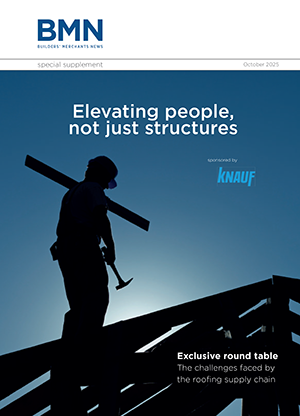Steve Halford, Group Managing Director of Crystal Direct, asks if merchants are keeping up with changing purchasing trends.
Like it or not, we're changing the way we buy.
As consumers, most builders, installers, private developers and builders' merchants go online at any time to look at what's available. We check out the choice and delve into details, even if we then pick up the phone or pay a visit to choose a car, hard landscaping, kitchen or bathroom.
Increasingly we order online, because slick retailers like Amazon and others have made it so easy, quick and convenient. There's not much we buy that doesn't involve online, one way or another. And, once you get used to it, it's frustrating to step back in time to a slower, less convenient way of doing things.
Does it matter if builders' merchants' sales of bespoke PVC-U windows and doors are growing at an extremely fast pace? I think so, because we know that merchants who sell with showrooms and online configurators sell much more, and more easily, than those who don't.
It's a valuable £5 billion a year market and merchants have taken to it in a big way. They've seen the potential, and are changing how they sell.
Showrooms make it easier for builders' merchants to engage with their builder and contractor customers. They're especially effective with high value home improvement products such as kitchens and bathrooms, where it's easier to visualise and see them in context. Showrooms create more engaging customer experiences for quality PVC-U windows and doors too.
It's important that merchants and suppliers continue working together to deliver an omnichannel approach to marketing high-ticket home improvement products. Smart customers go online first to find helpful, relevant content and their perceived product solution. But then, ready to buy, merchants need to follow through at branch level with knowledgeable staff and strong representation of the product, backed by reliable, on-time deliveries.
Bespoke PVC-U windows and doors have opened up a big, new market for merchants. But unless merchants put more resource and effort into developing seamless omnichannel marketing that combines online with showrooms and inbranch initiatives, many merchant markets will be vulnerable to new external threats.
Many builders' merchants have dismissed the threat from Amazon and online as being aimed at other markets and remote, because heavy building materials in particular are too heavy and difficult. Food is Amazon's current priority but we know building materials is on its target list. In June, Amazon bought Whole Foods in the US for £10.7 billion and could marry it up with its Amazon Go store concept. Using its app, shoppers can check in, take what they want from the shelves and walk out while Amazon automatically charges their account. Tesco shares fell 5% on the news, Sainsbury's 4%.
No market is safe from these powerful new threats. Omnichannel is here to stay, but it takes time to develop. The best defence is to develop your own now and get there first.









